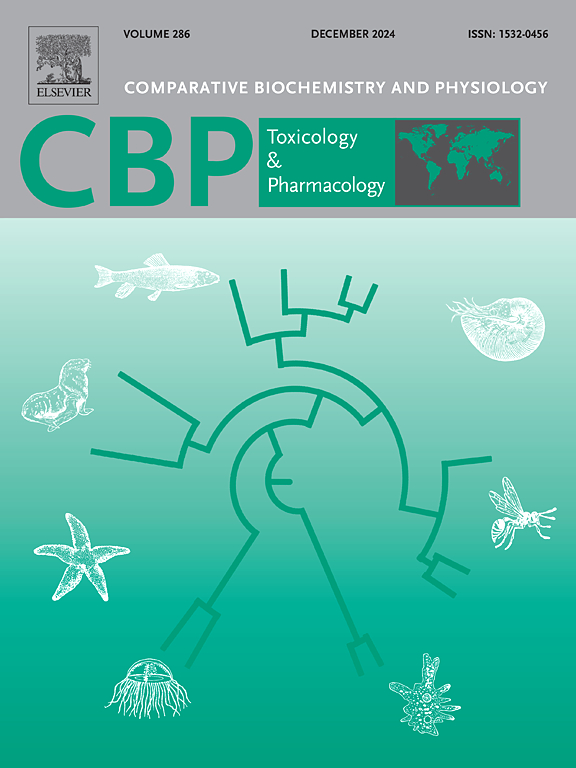亚硝酸盐和氨对鲢鱼(Hypophthalmichthys molitrix)头部肾脏炎症和免疫反应的交互影响随时间变化。
IF 3.9
3区 环境科学与生态学
Q2 BIOCHEMISTRY & MOLECULAR BIOLOGY
Comparative Biochemistry and Physiology C-toxicology & Pharmacology
Pub Date : 2024-11-21
DOI:10.1016/j.cbpc.2024.110078
引用次数: 0
摘要
亚硝酸盐和氨胁迫经常对水生动物产生有害影响。然而,氨和亚硝酸盐对免疫力的影响尚不清楚。为了确定氨气和亚硝酸盐对鲢鱼头部肾脏的交互影响,研究人员将鲢鱼置于氨气(15 毫克/升)、亚硝酸盐(10 毫克/升)或氨气+亚硝酸盐(15 毫克/升 + 10 毫克/升)和对照条件下 48 小时。结果表明,暴露于亚硝酸盐和氨中会导致头部肾脏细胞的细胞质丢失和空泡变性。暴露于亚硝酸盐和氨水后,肿瘤坏死因子α(TNF-α)和白细胞介素-1β(IL-1β)水平显著下降,而免疫球蛋白M(IgM)和补体3(C3)水平显著上升(P<0.05)。本文章由计算机程序翻译,如有差异,请以英文原文为准。

A time-dependent interactive effect of nitrite and ammonia on inflammatory and immune response in the head kidney of silver carp (Hypophthalmichthys molitrix)
Nitrite and ammonia stress frequently have harmful effects on aquatic animals. However, the effect of ammonia combined with nitrite on immunity is unclear. Aimed to determine their interactive effect on head kidney, silver carp were exposed to ammonia (15 mg/L), nitrite (10 mg/L), or ammonia+nitrite (15 mg/L + 10 mg/L), and control conditions for 48 h. The results showed that exposure to nitrite and ammonia caused loss of cytoplasm and vacuolar degeneration of cells in head kidney. Following exposure to nitrite and ammonia, tumor necrosis factor alpha (TNF-α) and interleukin-1β (IL-1β) levels decreased significantly, while immunoglobulin M (IgM) and complement 3 (C3) levels increased significantly (P < 0.05). Additionally, TNF-α and C3 were significantly affected synergistically by 24 h of exposure to ammonia+nitrite, while significantly antagonistic effect on IL-1β and C3 was observed after 48 h of exposure. After 48 h of exposure, differently expressed genes (DEGs) induced by ammonia, nitrite, and their combination were mainly assigned to molecular function and biological process, and complement and coagulation cascade pathway was enriched with the highest number of immunity-associated DEGs. Integrated biomarker response (IBR) in nitrite group was higher than that in ammonia group, and the combination of ammonia and nitrite increased and decreased the IBR induced by ammonia and nitrite after 24 and 48 h of exposure, respectively. In conclusion, the toxicities of ammonia and nitrite toward head kidney displayed inflammatory suppression and immune activation, and their had synergistic and antagonistic effects on head kidney at 24 h and 48 h, respectively.
求助全文
通过发布文献求助,成功后即可免费获取论文全文。
去求助
来源期刊
CiteScore
7.50
自引率
5.10%
发文量
206
审稿时长
30 days
期刊介绍:
Part C: Toxicology and Pharmacology. This journal is concerned with chemical and drug action at different levels of organization, biotransformation of xenobiotics, mechanisms of toxicity, including reactive oxygen species and carcinogenesis, endocrine disruptors, natural products chemistry, and signal transduction with a molecular approach to these fields.

 求助内容:
求助内容: 应助结果提醒方式:
应助结果提醒方式:


